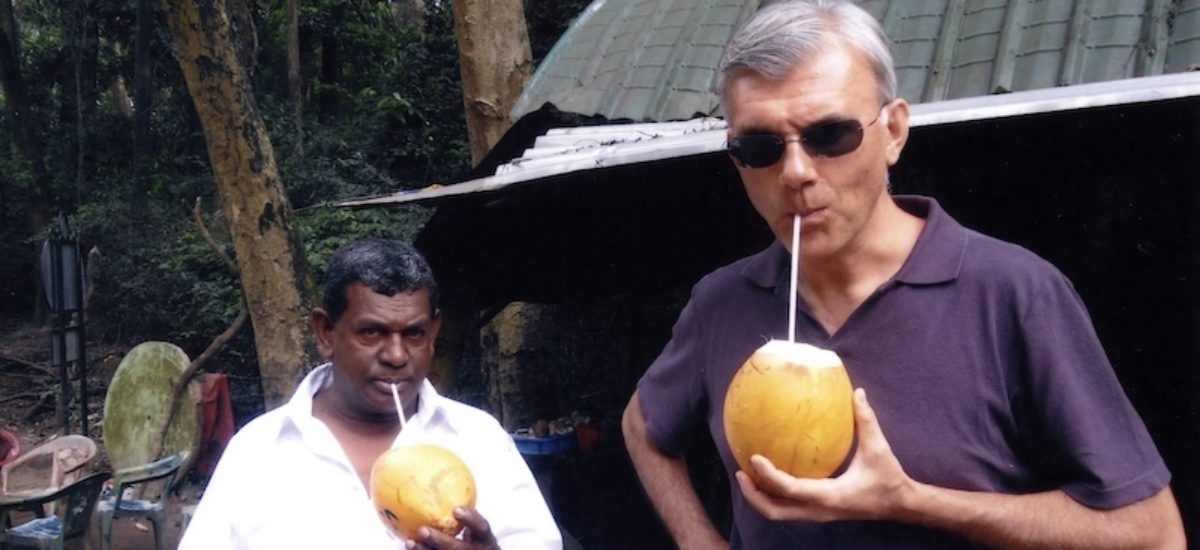Photo courtesy of Nikkei Asia
The Ceylon Literary Festival took place in Colombo in celebration of Sri Lanka’s art, culture and creativity. The three day programme was packed with a variety of talks with authors, podcasters, researchers, novelists, poets, playwrights, screenwriters, directors and journalists.
Razeen Sally, a Sri Lankan British travel writer, academic professor and founder of the European Centre for International Political Economy, discussed the beauty and struggle of reconciliation with Bhavani Fonseka, an attorney and senior researcher at the Centre for Policy Alternatives. Talking of what is in store for the country, Sally referenced his travel memoir Return to Sri Lanka, which was published in 2019.
Born to a British mother and a Sri Lankan father who was part of the Muslim community, Sally reflected on his childhood experiences growing up. Referring to his dual identity, he describes the sense of being both an insider and an outsider within the society even as a child. This is a perspective that he retained and refined over the years. Growing up in the Muslim community in Colombo, he did not travel around the country much and as a result was unable to discover the experiences of different communities.
When he was 12 years old he moved to the UK and returned to Sri Lanka when he was in his mid 40s with a nostalgia for his childhood. His journey back after decades sparked a yearning for reconnection and a deeper exploration of his roots. This eventually led to the writing of his travel memoir. In doing so, he wanted to tell his own story as well as a wider story about the country. By the time Sally was in his mid 20s he had become interested in travelling and after moving back to Sri Lanka a couple of decades later decided that writing a book would be the best way to get to know his own country. However, he adds that travel writing is inherently subjective. He mentions not wanting to write a policy analysis of Sri Lanka, instead choosing to look at the country accidentally and analytically. In the process of writing the book, Sally reflects that he was able to find a personal reconciliation with Sri Lanka, discovering an enduring humanity in the country.
Sally’s travel memoir delved into profound themes of personal experience, national recovery and the intricate layers of national identity in divided societies. Sally brought insights into the complexities of the past and present, sharing that, “ A new elite has come in, so far untainted by corruption, with a critical mass of people who seem to be genuinely interested and have the best of intentions. Some good appointments have been made, which is a break with past practice…I think one important point, going back to the theme of reconciliation, is that perhaps for the first time since 1956, we have a government which is not beholden to the Buddhist Sangha and I think that’s a crucial point.”
The discussion highlighted the challenges and changes in Sri Lanka, emphasising the importance of bottom up reconciliation and understanding different perspectives. Sally’s narrative underscored the significance of personal encounters and travel experiences in fostering a sense of shared humanity and bridging societal divides.
The second edition of Sally’s book features an epilogue that covers recent developments including insights from his extensive travels around the country post-Covid, which he describes as a personally transformative experience. The epilogue explores the broader, increasingly fragmented global political landscape, capturing the uncertain and unsettling atmosphere following the pandemic. Sally’s reflections on the country’s economic and political landscape offer a nuanced perspective on the opportunities and challenges ahead.
“ In the last two years in the post Covid era, it was actually a three week journey in the company of my favorite Buddhist monk, who’s a close friend. I met him during my decade in Singapore and then he went back to Australia. I persuaded him to come back to Sri Lanka after a gap of about 20 years. And we did a 17 day, 200 kilometre journey around the island, covering about 30 to 35 Buddhist sites. Most of them are off the beaten track and unfamiliar. We deliberately avoided the best known sites. I’d been to most of them before but some of them were new,” he said.
Answering questions, Sally addressed issues of reconciliation and personal challenges in transitioning from academic analysis to travel writing and offered advice to aspiring travel writers. The evolving narrative of national identity, the need for policy changes and the pivotal role of travel in fostering understanding and empathy were also explored.
The discussion served as a testament to the power of storytelling, travel and dialogue in fostering reconciliation and understanding in a diverse and complex society like Sri Lanka. Sally’s reflections on home resonated with many, highlighting Sri Lanka as a place that holds a deep sense of belonging and connection. “ Home is different places but Sri Lanka probably feels more like home than anywhere else. Let’s put it that way,” he concluded.

